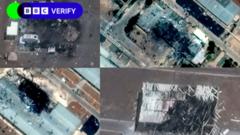**As Israel's offensive raises tensions, the possibility of reviving diplomatic engagements over Iran's nuclear ambitions remains, with both sides emphasizing their respective stances.**
**Renewed Diplomatic Efforts Amid Israeli-Iranian Tensions**

**Renewed Diplomatic Efforts Amid Israeli-Iranian Tensions**
**Iran remains open to nuclear negotiations despite recent Israeli strikes aimed at halt talks, signaling complexities ahead.**
As we navigate through escalating tensions between Israel and Iran, particularly following Israel's recent military actions, the prospect of renewed diplomatic negotiations surrounding Iran's nuclear program cannot be overlooked. Israeli Prime Minister Benjamin Netanyahu views the attack as a necessary pre-emptive strike against a potential Iranian nuclear threat, even as a sixth round of negotiations was being prepared between the United States and Iran.
In stark contrast, Iranian Foreign Minister Abbas Araghchi announced that Tehran is still open to discussions regarding its nuclear capabilities, noting, “We are prepared for any agreement aimed at ensuring Iran does not pursue nuclear weapons.” However, this openness comes with conditions; Iran maintains its stance that it will not relinquish its rights to enrich uranium, essential for both civilian uses and, controversially, potential weaponization.
Iran accuses Israel of undermining diplomacy through its military actions, a sentiment echoed by several Western analysts. Araghchi remarked that the Israeli regime is intent on preventing any agreement regarding Iran's nuclear agenda, countering Netanyahu's belief that such accords could pave the way for a nuclear-armed Iran.
Former U.S. President Donald Trump advocates for successful negotiations, suggesting that Israel's attack could compel Iran into a more amenable position. Nonetheless, Iranian officials assert their entitlement to nuclear enrichment under the Nuclear Nonproliferation Treaty, a factor that could complicate any quick agreements.
Political analysts, including Johns Hopkins' Vali Nasr, caution against expectations of an easy concession from Iran regarding enrichment. The implications of any rapid agreement perceived as surrender could jeopardize the regime's stability domestically, making a straightforward resolution increasingly unlikely.
As tensions mount and diplomatic pathways appear fraught, the global community watches closely, anticipating how both nations will navigate this intricate landscape.
In stark contrast, Iranian Foreign Minister Abbas Araghchi announced that Tehran is still open to discussions regarding its nuclear capabilities, noting, “We are prepared for any agreement aimed at ensuring Iran does not pursue nuclear weapons.” However, this openness comes with conditions; Iran maintains its stance that it will not relinquish its rights to enrich uranium, essential for both civilian uses and, controversially, potential weaponization.
Iran accuses Israel of undermining diplomacy through its military actions, a sentiment echoed by several Western analysts. Araghchi remarked that the Israeli regime is intent on preventing any agreement regarding Iran's nuclear agenda, countering Netanyahu's belief that such accords could pave the way for a nuclear-armed Iran.
Former U.S. President Donald Trump advocates for successful negotiations, suggesting that Israel's attack could compel Iran into a more amenable position. Nonetheless, Iranian officials assert their entitlement to nuclear enrichment under the Nuclear Nonproliferation Treaty, a factor that could complicate any quick agreements.
Political analysts, including Johns Hopkins' Vali Nasr, caution against expectations of an easy concession from Iran regarding enrichment. The implications of any rapid agreement perceived as surrender could jeopardize the regime's stability domestically, making a straightforward resolution increasingly unlikely.
As tensions mount and diplomatic pathways appear fraught, the global community watches closely, anticipating how both nations will navigate this intricate landscape.





















